
Slovenia, officially the Republic of Slovenia, is a country in southern Central Europe. It is bordered by Italy to the west, Austria to the north, Hungary to the northeast, Croatia to the south and southeast, and a short coastline within the Adriatic Sea to the southwest. Slovenia is mostly mountainous and forested, covers 20,271 square kilometres (7,827 sq mi), and has a population of 2.1 million. Slovenes constitute over 80% of the country's population. Slovene, a South Slavic language, is the official language. Slovenia has a predominantly temperate continental climate, with the exception of the Slovene Littoral and the Julian Alps. A sub-mediterranean climate reaches to the northern extensions of the Dinaric Alps that traverse the country in a northwest–southeast direction. The Julian Alps in the northwest have an alpine climate. Toward the northeastern Pannonian Basin, a continental climate is more pronounced. Ljubljana, the capital and largest city of Slovenia, is geographically situated near the centre of the country.

Slovene or Slovenian is a Western member of South Slavic languages, which belong to the Balto-Slavic branch of the Indo-European language family. Most of its 2.5 million speakers are the inhabitants of Slovenia, majority of them ethnic Slovenes. As Slovenia is part of the European Union, Slovene is also one of its 24 official and working languages. Its syntax is highly fusional and characterized by dual grammatical number. Two accentual norms are used. Its flexible word order is often adjusted for emphasis or stylistic reasons, although basically it is a SVO language. It has a T–V distinction: the use of the V-form demonstrates a respectful attitude towards superiors and the elderly, while it can be sidestepped through the passive form.
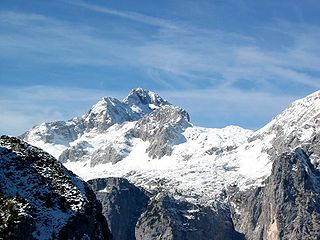
Triglav, with an elevation of 2,863.65 metres (9,395.2 ft), is the highest mountain in Slovenia and the highest peak of the Julian Alps. The mountain is the pre-eminent symbol of the Slovene nation. It is the centrepiece of Triglav National Park, Slovenia's only national park. Triglav was also the highest peak in Yugoslavia before Slovenia's independence in 1991.
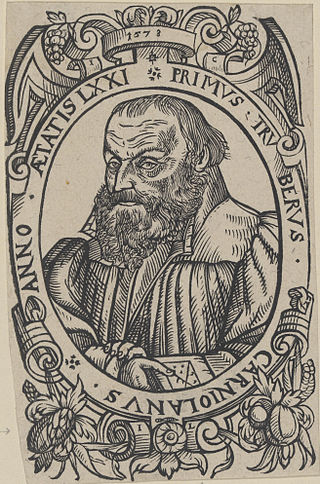
Primož Trubar or Primus Truber was a Slovene Protestant Reformer of the Lutheran tradition, mostly known as the author of the first Slovene language printed book, the founder and the first superintendent of the Protestant Church of the Duchy of Carniola, and for consolidating the Slovenian language. Trubar introduced The Reformation in Slovenia, leading the Austrian Habsburgs to wage the Counter-Reformation, which a small Protestant community survived. Trubar is a key figure of Slovenian history and in many aspects a major historical personality.

Milan Vidmar was a Slovenian electrical engineer, chess player, chess theorist, and writer. He was among the top dozen chess players in the world from 1910 to 1930 and in 1950, was among the inaugural recipients of the title International Grandmaster from FIDE. Vidmar was a specialist in power transformers and transmission of electric current.
Delo is a national daily newspaper in Slovenia. For more than 60 years, Delo has been involved in active co-creation of the Slovenian public space. It covers politics, economics, sports, culture and social events in Slovene. In addition to Slovenia, the paper is available in several Croatian cities and in Belgrade, Serbia. It is based in Ljubljana.
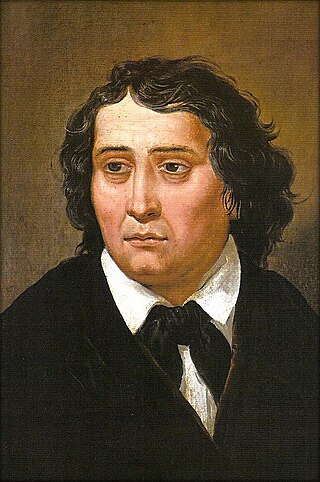
France Prešeren was a 19th-century Romantic Slovene poet whose poems have been translated into many languages.
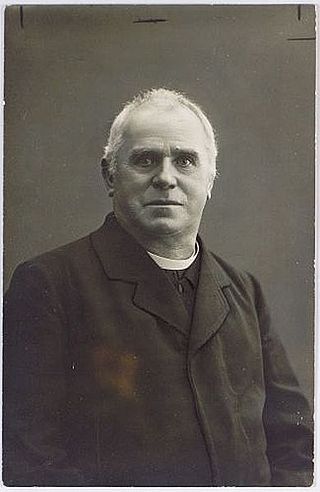
Jakob Aljaž was a Slovene Roman Catholic priest, composer and mountaineer.

Slovene Americans or Slovenian Americans are Americans of full or partial Slovene or Slovenian ancestry. Slovenes mostly immigrated to America during the Slovene mass emigration period from the 1880s to World War I.

Slovenia has participated in the Eurovision Song Contest 28 times since its debut in 1993, having hosted a qualification round in Ljubljana for seven countries due to the influx of new nations wishing to join the Eurovision Song Contest. Having only missed the event twice in 1994 and 2000 due to the relegation rule after a poor average score in the 1990s, Slovenia's best result is seventh position achieved on two occasions; in 1995 with "Prisluhni mi" performed by Darja Švajger and in 2001 with Nuša Derenda and "Energy". Since the introduction of the semi-finals in 2004, Slovenia has qualified for the final on seven occasions. As of 2023, Slovenia has not made it to the top ten since their seventh place finish in 2001, only making it to the thirteenth position in 2002 and 2011.

Slovene culture is the culture of the Slovenes, a south Slavic ethnic group. It is incredibly diverse for the country's small size, spanning the southern portion of Central Europe, being the melting pot of Slavic, Germanic and Romance cultures while encompassing the Eastern Alps, Adriatic sea, Panonian plain and a part of Balkan peninsula.
A1 Slovenija is a telecommunications company operating the second largest mobile network in Slovenia. Prior to April 2017, the company was known as Si.mobil.
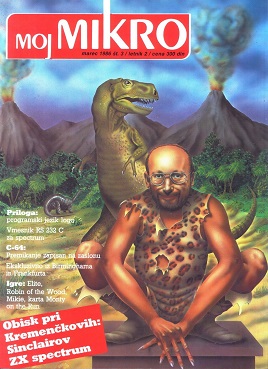
Moj mikro was a monthly Slovene-language computer magazine published in Slovenia. It was in circulation between 1984 and 2015. Moj mikro was one of the most popular IT magazines in Yugoslavia during the 80's, spanning a large variety of technology topics and was published in Slovenian and Serbo-Croatian.

Alya is a Slovenian pop singer.

Tone Partljič is a Slovene writer, playwright and politician. Between 1990 and 2004 he was a member of the Slovenian National Assembly, from 1994 as a member of the LDS party. He was also president of the Slovene Writers' Association between 1983 and 1987.

The Municipality of Preddvor is a municipality in Slovenia. The seat of the municipality is the town of Preddvor. The municipality was established on 3 October 1994, when the former larger Municipality of Kranj was subdivided into the municipalities of Cerklje na Gorenjskem, Kranj, Naklo, Preddvor, and Šenčur. The municipality was reduced in size on 7 August 1998 by the creation of the Municipality of Jezersko from its territory.

Vruće Ljetovanje is an adventure game published by Suzy Soft for ZX Spectrum in 1985. It was written and developed by Ivan Gerenčir and Milan Pavičević, with graphics done by artist Igor Kordey. The game is notable for being the first Yugoslav adventure game with full color graphics, as well as the first adventure game from Croatia. The game depicts the daily life of Srećko, and his family, who are preparing for a trip to their summer vacation on the coastline, and as such portrays the daily life in the former country. It was published simultaneously in Serbo-Croatian and Slovenian language and retailed at 900 Yugoslav dinars.
Slovenia participated in the Eurovision Song Contest 2023 in Liverpool, United Kingdom, having internally selected Joker Out to represent the country with the song "Carpe Diem", written by band members Bojan Cvjetićanin, Jan Peteh, Jure Maček, Kris Guštin and Nace Jordan, alongside Žarko Pak. Joker Out were announced as the Slovenian entrants to the contest on 8 December 2022, whilst their song was presented to the public in a televised presentation show, Misija Liverpool, on 4 February 2023.

Joker Out is a five-member Slovenian indie rock band formed in 2016, who describe their genre as 'Shagadelic Rock n' Roll.' They had represented Slovenia in the Eurovision Song Contest 2023 with the song "Carpe Diem", placing 21st. Their discography includes two studio albums: Umazane misli (2021), and Demoni (2022).















